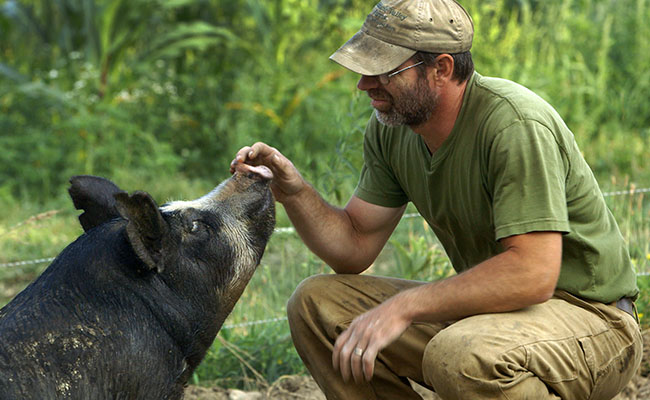A moving meditation on a man’s crisis of faith, THE LAST PIG follows Bob Comis as he concludes his last season as a pig farmer. Peppered with reflections on his decade with the pigs, farmer Bob’s introspective voiceover guides us through the changing seasons on the farm, and the images, often filmed at ground-level, merge us with the drove. Director Allison Argo masterfully gives weight to what at first appear to be mundane daily rituals, and as an ethical question swells for farmer Bob, it does for us as well. In this intimate portrayal of a man at a crossroads, we are welcomed into the sacred moment of choice.
THE LAST PIG is the winner of the 2017 Zelda Penzel “Giving Voice to the Voiceless” Award, given to a film in the Compassion, Justice & Animal Rights program. A panel will follow the screening on October 8.

What a lovely, meditative film you’ve made. Please describe THE LAST PIG in your own words.
Allison Argo: For me, THE LAST PIG is a meditation on what it means to be a sentient creature with the power to kill. That power is profoundly linked to one’s very core, to one’s deepest beliefs and convictions. The film is extremely immersive, following a farmer through his final season of slaughtering pigs. With sparse, personal musings, the farmer shares his conflict about a life spent “peddling in death” and gradually, his struggle becomes our own. The film is, at the same time, both small and vast. It offers time and space for deep thought within the intimacy of one person’s story. The story unfolds unhurriedly, often in real time, asking the viewer to stop…and experience: the gaze of a pig, the bucolic landscape, the farmer’s turmoil, the concrete slaughterhouse, and the ghosts.
What inspired you to make this film? How did you connect with Bob Comis?
Allison Argo: Three years ago a friend sent me an email with a link to an essay on the Huffington Post. When I clicked, I landed on a page titled: “Happy Pigs Make Happy Meat?” The blog was by a pig farmer named Bob Comis, who was questioning the ethics of slaughter. By the time I finished his essay, I was weeping.
Almost all of my films have focused on endangered and/or abused animals, but I’d never made a film about those trapped in the livestock industry. When I learned about this pig farmer in the throes of a moral dilemma, I felt his story had to be documented. It’s an incredible privilege that he allowed us to document his transition for the next nine months. It was extraordinary to capture his year of transition—and I’m grateful that the film has given voice to the pigs on his farm. These individuals are rarely considered. Through this very intimate story, I hope viewers will begin to connect the dots between their choices and the impact those choices have on others.
Your style of filmmaking is very pastoral. How did you decide the framing and tone?
Allison Argo: I knew from reading what Bob had written, and also from his solitary farming life, that the film needed to be contemplative and extremely quiet and personal. I wanted the film to be bare bones and honest, without embellishment; simply his journey, as raw as it was. I wanted to let shots and sequences play out fully—without fast edits—both in the field and in the edit room. I felt this would be more honest and real. It also gives the viewer time to process what they’re seeing and hearing, which I think is key to this film.
The farmer describes taking care of the pigs as a way to cope with depression. Why do you think he chose this unconventional method?
Allison Argo: I don’t think Bob’s connection with the pigs was premeditated. He didn’t anticipate that the pigs would help him cope with his bouts of depression and anxiety. From what he shared, it was a surprise and a gradual evolution: “Without really thinking about it too much, it was mostly subconscious, I ended up noticing how they have the same emotional responses to stress, and anxiety and fear that I did.” I think as he became more compassionate towards the pigs, he became more compassionate towards himself.
What advice can you give filmmakers who want to tell stories that give a voice to those that cannot speak for themselves?
Allison Argo: My advice would be: never lose sight of why you are making your film. Your compassion for these beings will give you the stamina, energy and insight to follow through and give it your all. There are plenty of times when I get discouraged or feel lost… then I think of Ron, the chimpanzee, or Shirley, the elephant, or the herds of pigs on Bob’s farm. I get re-energized and my conviction to bring their stories to the world is renewed. I focus on those in our society who have no voice—and I feel it’s my mission in life to bring their stories, their struggles, to the world.
What do you want Hamptons audiences to take away from THE LAST PIG?
Allison Argo: I hope that THE LAST PIG will inspire people in the audience to think about the impact of their actions. To take stock of who they are—in the deepest sense—and to take ownership of how they live their lives. I hope the viewers will be inspired to live more compassionately and to respect all of those around them, whether two-legged, four-legged, with feathers or fins. However—and this is important—THE LAST PIG is careful not to tell viewers what they should think or feel or even eat… The film simply invites people to join the farmer or his journey—and to think.
Our Compassion, Justice & Animal Rights section has quickly become an integral part of the Festival. What are you looking forward to most at HIFF25?
Allison Argo: I can’t wait to be in a theater full of people who are there because they care. I’m so looking forward to the lights dimming and the audience joining Bob on his journey. This is tremendous honor, and I’m truly impressed that HIFF has a Compassion, Justice and Animal Rights category. Thank you for giving THE LAST PIG this very extraordinary opportunity and honor!
Check out the screening of THE LAST PIG and the panel discussion following in the Compassion, Justice & Animal Rights section of HIFF25. Find tickets. Follow THE LAST PIG on Facebook and Twitter.





